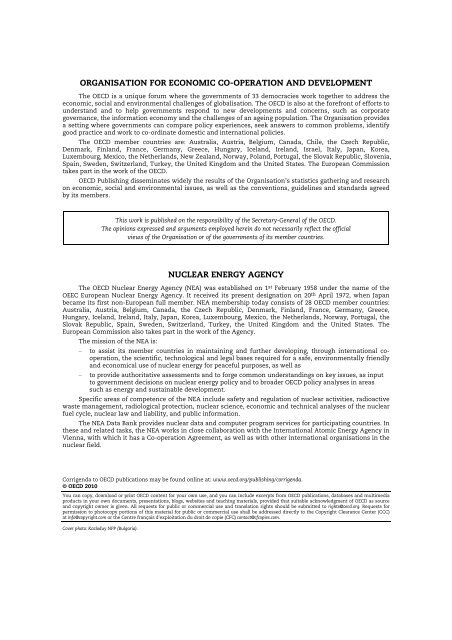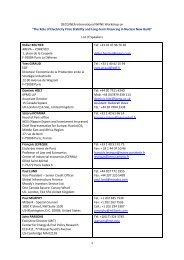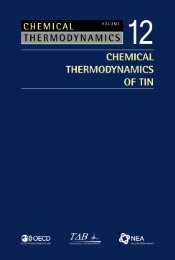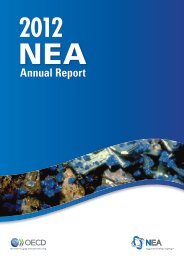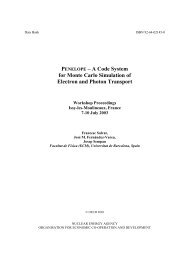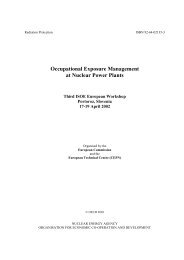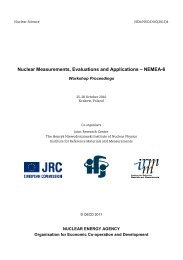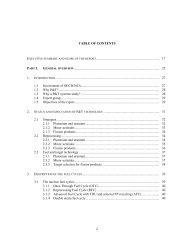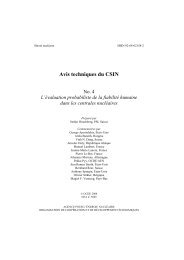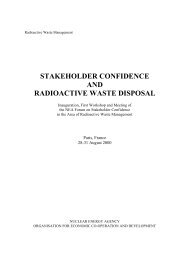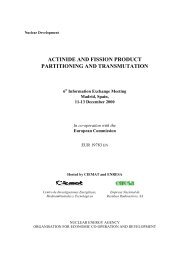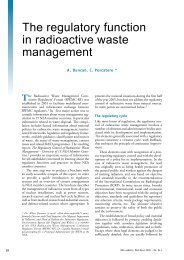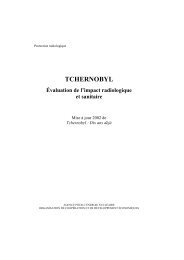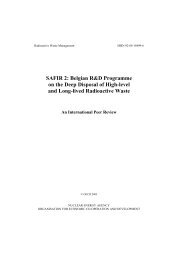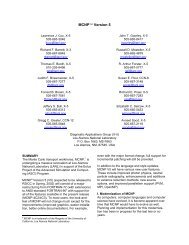VVER-1000 Coolant Transient Benchmark - OECD Nuclear Energy ...
VVER-1000 Coolant Transient Benchmark - OECD Nuclear Energy ...
VVER-1000 Coolant Transient Benchmark - OECD Nuclear Energy ...
You also want an ePaper? Increase the reach of your titles
YUMPU automatically turns print PDFs into web optimized ePapers that Google loves.
ORGANISATION FOR ECONOMIC CO-OPERATION AND DEVELOPMENT<br />
The <strong>OECD</strong> is a unique forum where the governments of 33 democracies work together to address the<br />
economic, social and environmental challenges of globalisation. The <strong>OECD</strong> is also at the forefront of efforts to<br />
understand and to help governments respond to new developments and concerns, such as corporate<br />
governance, the information economy and the challenges of an ageing population. The Organisation provides<br />
a setting where governments can compare policy experiences, seek answers to common problems, identify<br />
good practice and work to co-ordinate domestic and international policies.<br />
The <strong>OECD</strong> member countries are: Australia, Austria, Belgium, Canada, Chile, the Czech Republic,<br />
Denmark, Finland, France, Germany, Greece, Hungary, Iceland, Ireland, Israel, Italy, Japan, Korea,<br />
Luxembourg, Mexico, the Netherlands, New Zealand, Norway, Poland, Portugal, the Slovak Republic, Slovenia,<br />
Spain, Sweden, Switzerland, Turkey, the United Kingdom and the United States. The European Commission<br />
takes part in the work of the <strong>OECD</strong>.<br />
<strong>OECD</strong> Publishing disseminates widely the results of the Organisation’s statistics gathering and research<br />
on economic, social and environmental issues, as well as the conventions, guidelines and standards agreed<br />
by its members.<br />
This work is published on the responsibility of the Secretary-General of the <strong>OECD</strong>.<br />
The opinions expressed and arguments employed herein do not necessarily reflect the official<br />
views of the Organisation or of the governments of its member countries.<br />
NUCLEAR ENERGY AGENCY<br />
The <strong>OECD</strong> <strong>Nuclear</strong> <strong>Energy</strong> Agency (NEA) was established on 1st February 1958 under the name of the<br />
OEEC European <strong>Nuclear</strong> <strong>Energy</strong> Agency. It received its present designation on 20th April 1972, when Japan<br />
became its first non-European full member. NEA membership today consists of 28 <strong>OECD</strong> member countries:<br />
Australia, Austria, Belgium, Canada, the Czech Republic, Denmark, Finland, France, Germany, Greece,<br />
Hungary, Iceland, Ireland, Italy, Japan, Korea, Luxembourg, Mexico, the Netherlands, Norway, Portugal, the<br />
Slovak Republic, Spain, Sweden, Switzerland, Turkey, the United Kingdom and the United States. The<br />
European Commission also takes part in the work of the Agency.<br />
The mission of the NEA is:<br />
– to assist its member countries in maintaining and further developing, through international cooperation,<br />
the scientific, technological and legal bases required for a safe, environmentally friendly<br />
and economical use of nuclear energy for peaceful purposes, as well as<br />
– to provide authoritative assessments and to forge common understandings on key issues, as input<br />
to government decisions on nuclear energy policy and to broader <strong>OECD</strong> policy analyses in areas<br />
such as energy and sustainable development.<br />
Specific areas of competence of the NEA include safety and regulation of nuclear activities, radioactive<br />
waste management, radiological protection, nuclear science, economic and technical analyses of the nuclear<br />
fuel cycle, nuclear law and liability, and public information.<br />
The NEA Data Bank provides nuclear data and computer program services for participating countries. In<br />
these and related tasks, the NEA works in close collaboration with the International Atomic <strong>Energy</strong> Agency in<br />
Vienna, with which it has a Co-operation Agreement, as well as with other international organisations in the<br />
nuclear field.<br />
Corrigenda to <strong>OECD</strong> publications may be found online at: www.oecd.org/publishing/corrigenda.<br />
© <strong>OECD</strong> 2010<br />
You can copy, download or print <strong>OECD</strong> content for your own use, and you can include excerpts from <strong>OECD</strong> publications, databases and multimedia<br />
products in your own documents, presentations, blogs, websites and teaching materials, provided that suitable acknowledgment of <strong>OECD</strong> as source<br />
and copyright owner is given. All requests for public or commercial use and translation rights should be submitted to rights@oecd.org. Requests for<br />
permission to photocopy portions of this material for public or commercial use shall be addressed directly to the Copyright Clearance Center (CCC)<br />
at info@copyright.com or the Centre français d'exploitation du droit de copie (CFC) contact@cfcopies.com.<br />
Cover photo: Kozloduy NPP (Bulgaria).


